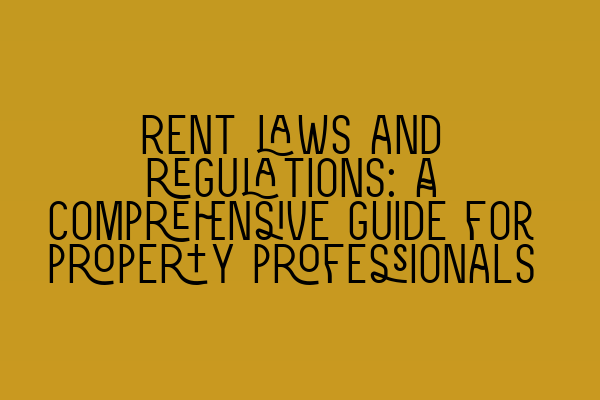Rent Laws and Regulations: A Comprehensive Guide for Property Professionals
Welcome to SQE Property Law & Land Law’s comprehensive guide on rent laws and regulations. As a property professional, it is essential to have a deep understanding of the legal framework surrounding rental properties. This guide aims to provide you with the knowledge and insights necessary to navigate the complex world of rent laws with ease and confidence.
Understanding Rent Laws and Regulations
When it comes to renting properties, both landlords and tenants must adhere to a set of laws and regulations that govern their rights and responsibilities. These laws ensure a fair and transparent relationship between the parties involved. An understanding of these laws is essential for property professionals to effectively advise their clients and avoid any legal complications.
Here, we will explore key aspects of rent laws and regulations, including:
Tenancy Agreements
A tenancy agreement is a legal contract that outlines the terms and conditions of the rental agreement between the landlord and the tenant. It is essential to have a well-drafted tenancy agreement that clearly defines the rights and obligations of both parties.
In our Legal Challenges in Property Transactions guide, we delve deeper into the intricacies of drafting an airtight tenancy agreement, providing valuable insights and tips to avoid common pitfalls.
Security Deposits
A security deposit is a sum of money paid by the tenant to the landlord at the start of the tenancy. It serves as a safeguard against potential damages or unpaid rent. Understanding the regulations surrounding security deposits is crucial to protect your clients’ interests.
For a comprehensive examination of security deposits and their legal implications, refer to our article on Avoiding Common Pitfalls in Property Law Questions.
Rent Increases
As a property professional, you may encounter situations where rent increases are necessary. However, it is important to follow the prescribed legal procedures to ensure a fair and lawful increase.
Our guide on Land Law Revision Tips provides expert insights into the considerations and guidelines surrounding rent increases.
Repairs and Maintenance
Landlords have a legal obligation to ensure that their rental properties are safe and habitable throughout the tenancy. Tenants have the right to live in a well-maintained property, free from hazards and risks.
To gain a deeper understanding of the legal considerations related to repairs and maintenance, our article on Mortgages and Land Law: Essential Considerations for Property Transactions provides valuable insights.
Eviction Process
In unfortunate scenarios where eviction becomes necessary, it is vital to follow the proper legal procedures. Failure to do so may lead to legal consequences and unnecessary disputes.
To acquire a comprehensive understanding of the eviction process, we recommend our article on Environmental Ethics in Land Law, which examines the balance between development and sustainability in property law.
Conclusion
In conclusion, a thorough knowledge of rent laws and regulations is crucial for property professionals to operate within legal boundaries and offer sound advice to their clients. By understanding the intricacies of tenancy agreements, security deposits, rent increases, repairs and maintenance, and the eviction process, you can navigate the rental landscape with confidence.
For more in-depth information on various aspects of property law and land law, be sure to explore our range of comprehensive articles:
- Legal challenges in property transactions: A comprehensive guide
- Dominate Property Law Questions: Avoiding Common Pitfalls
- Land Law Revision Tips: Ace Your Exam Preparation
- Mortgages and land law: Essential considerations for property transactions
- Environmental Ethics in Land Law: Balancing Development and Sustainability
Stay informed, be confident, and excel in your property profession with SQE Property Law & Land Law.
